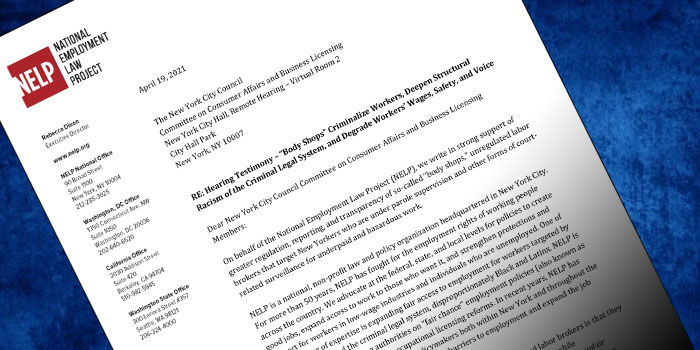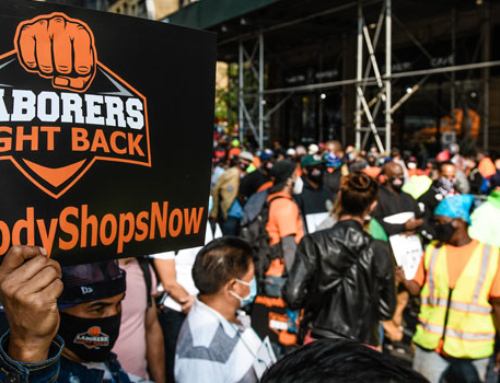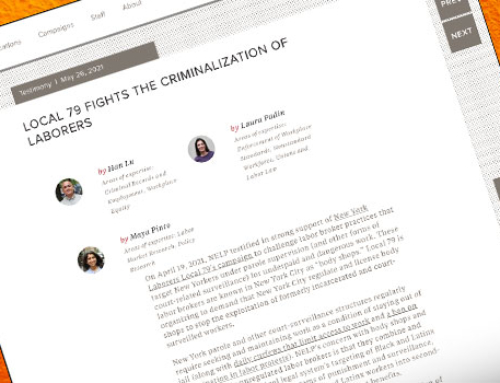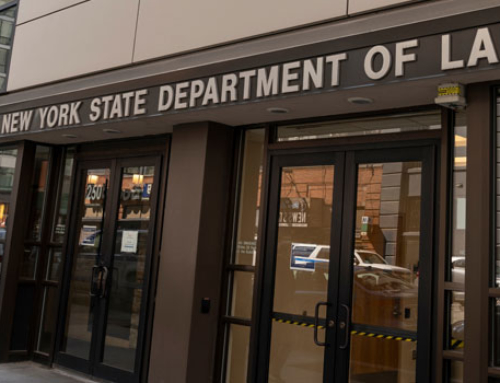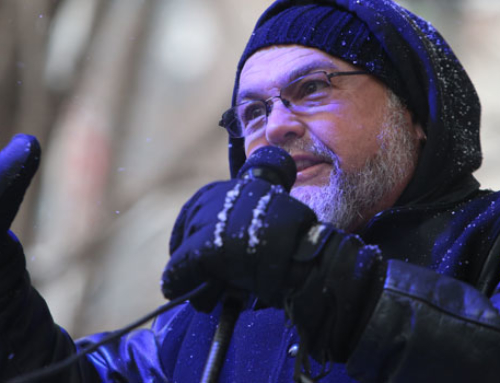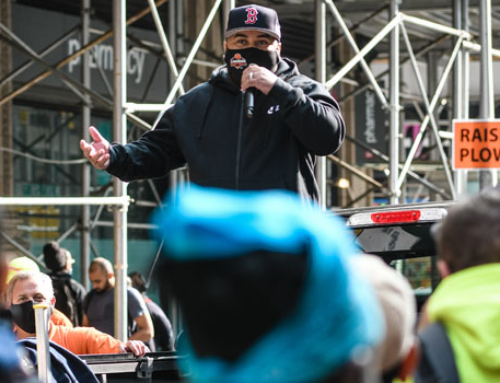The New York City Council
Committee on Consumer Affairs and Business Licensing
New York City Hall, Remote Hearing – Virtual Room 2
City Hall Park
New York, NY 10007
RE: Hearing Testimony – “Body Shops” Criminalize Workers, Deepen Structural Racism of the Criminal Legal System, and Degrade Workers’ Wages, Safety, and Voice Dear New York City Council Committee on Consumer Affairs and Business Licensing Members:
On behalf of the National Employment Law Project (NELP), we write in strong support of greater regulation, reporting, and transparency of so-called “body shops,” unregulated labor brokers that target New Yorkers who are under parole supervision and other forms of court related surveillance for underpaid and hazardous work.
NELP is a national, non-profit law and policy organization headquartered in New York City. For more than 50 years, NELP has fought for the employment rights of working people across the country. We advocate at the federal, state, and local levels for policies to create good jobs, expand access to work to those who want it, and strengthen protections and support for workers in low-wage industries and individuals who are unemployed. One of NELP’s areas of expertise is expanding fair access to employment for workers targeted by criminalization and the criminal legal system, disproportionately Black and Latinx. NELP is one of the nation’s leading authorities on “fair chance” employment policies (also known as “ban the box”) and fair chance occupational licensing reforms. In recent years, NELP has worked closely with advocates and policymakers both within New York and throughout the country to craft policies and law that reduce barriers to employment and expand the job prospects of people with records.
NELP’s concern with “body shops” and other similarly unregulated labor brokers is that they overemphasize the anti-recidivist or rehabilitative quality of any work, while underemphasizing risks endured by court-surveilled New Yorkers both to (1) unfair discrimination and lost earnings, and (2) working under the threat of jail. By targeting workers made desperate for work by court-surveillance and the threat of re-incarceration, unregulated labor brokers combine and exacerbate racialized inequalities for workers in criminal punishment, workplace safety, and wages. As social movements challenging mass incarceration and criminalization continue to grow, we are especially concerned that court surveilled work under the threat of jail will be championed by some as meaningful reform and not seen for what it is: expanding a vulnerable workforce by locking workers of color into long cycles of low wages and jail.
Two trends, traditionally viewed as separate domains, appear increasingly bound together. The first is that over the last 40 years, the US labor market has gradually shifted from longterm, direct-hire jobs with employer-sponsored benefits and high unionization rates to shorter-term, increasingly precarious contract jobs with lower wages, fewer benefits, and more obstacles to collective worker action.1 The second is that over the same four decades, the US has increased its incarcerated population by 500% to 2.2 million people — crowning itself the world’s incarceration leader — under a sprawling system of punishment and surveillance that targets Black and Latinx people. This unprecedented expansion of incarceration has been combined with a radical defunding and deterioration of social service, public health, and welfare functions of government at all levels.2 The rise of unregulated labor brokers is central to this recent history of workplace degradation and destabilization. So too is the rise of contemporary social movements that in the past decade plus have repeatedly challenged inflated and overfunded municipal, state, and federal budgets that expand punishment and surveillance and deepen radical, racialized economic inequality.
Body shops in New York City are at the center of this history today. Labor brokers, in this case body shops, hire and pay workers who perform work for third party companies, known as “host employers.” Brokers profit by charging the host employer a markup on the hourly workers’ wages. Brokers compete with one another by driving down the cost of labor, the only cost they control, which incentivizes paying poverty wages and cutting corners on meaningful training and workplace safety and health standards.4 These workers often work alongside the host employer’s permanent workforce resulting in a second-tier workforce who do the same or similar work as workers hired directly by the host employer, but for less pay, nearly non-existent benefits, and no job security. The labor broker system drives down wages and “insulates the host companies from workers’ compensation, unemployment taxes, union drives, and the duty to ensure that their workers are citizens or legal immigrants,” allowing host employers to control working conditions without being responsible for them. Labor brokers are an engine of occupational segregation, sorting Black and Brown workers into this second-tier status and other forms of bad work.6 Unemployment insurance structures that exclude incarcerated or brokered workers or tax programs like the Work Opportunity Tax Credit can subsidize the labor broker industry, and therefore subsidize low wage, unstable work. Labor brokers, in this case New York City body shops, that target court-surveilled workers for low wage work ensure the silencing of working New Yorkers’ voices in some of the most dangerous professions7 and depress wage and safety standards in the City.
The threat of poverty faced by court-surveilled workers is real, and it is racist. NELP estimates that 60 percent of those who have been incarcerated remain unemployed a year after release. People with incarceration histories are four to six times more likely to be unemployed than similarly situated peers without a record.10 Only 55 percent of formerly incarcerated people report any earnings whatsoever one year after release, with the median earnings barely exceeding $10,000 annually.11 The Brennan Center for Justice recently concluded that formerly imprisoned people can expect to earn approximately 52 percent less in annual income than similarly situated peers who were never incarcerated. The financial impact of an arrest or conviction record is radically anti-Black: Black people without a court record earn less annually and receive fewer call backs from prospective employers than white people with a record.13 These studies strongly suggest that anti-Black racism both in the criminal legal system and within the broader labor market compound one another, shaping work opportunities more than — and in addition to — the presence of an arrest or conviction record.
Similarly, the threat of re-incarceration for New Yorkers on parole is real, and it is racist. There are approximately 35,000 New Yorkers under parole supervision on any given day. A recent study published by Columbia University Justice Lab found that New York State reincarcerates more people on parole for technical rule violations than any other state in the US. Technical rule violations are not allegations of a new criminal offense but are violations of parole rules that regularly include passing alcohol or drug tests, satisfactory payment of criminal justice debt, completing court-mandated classes, maintaining curfew, and seeking and maintaining employment. Those accused of violating parole rules in New York can be held in jail for several months as allegations are resolved with no right to a bail setting. The threat of re-incarceration for technical parole rule violations is dramatically anti-Black and anti-Latinx. In New York City, Black and Latinx people on parole are 12 and four times more likely to be reincarcerated for technical violations than white people on parole.
Body shops and similar labor brokers exacerbate the well-documented and staggering structural racism found in the criminal legal system. The UCLA Institute for Research on Labor and Employment estimates that on any given day in the US, approximately 9,000 people are incarcerated for violating a probation or parole requirement to maintain employment, and an additional 32,000 are incarcerated for violating a requirement to pay a court-related debt.18 Court-surveilled workers face pressure from the parole system or other “community supervision” programs to accept lower work standards. The reality, for instance, that someone can only find jobs that pay illegally low wages in New York is all-toofrequent, where one in 20 workers makes less than minimum wage. Whether a court surveilled worker can reject or refuse an unfair or unsafe job is dramatically undercut by the threat of jail, causing such workers to enter and remain in jobs with depressed labor standards. These effects are wide ranging in New York City. A recent study estimated that in 2020, 9,173 court-surveilled workers worked in the New York City construction industry through body shops and calculated deep losses in consumption spending and economic activity across neighborhoods for each of the City’s five boroughs resulting from the use of body shops.
We believe New York City is positioned to lead in challenging racialized vulnerabilities court surveilled workers face in the workplace. Requiring transparency and greater reporting from opaque and unregulated labor brokers will be the first step. Ultimately, court-surveilled New Yorkers are our family members, co-workers, and neighbors who are also experiencing our unprecedented public health and unemployment crises. Body shop practices expand the criminalization of New York’s workers, whereby court-involvement is understood by employers to indicate deserving-less-at-work, and unemployment is understood by the criminal legal system as criminality. These practices increase the risks of silencing workers’ voices, degrading work safety standards, and exacerbating racialized economic inequality to court-surveilled New Yorkers, which in turn increase these risks to the whole of us.
For these reasons, the National Employment Law Project supports the Council in establishing greater regulation, reporting, and transparency in labor brokers that target court-surveilled New Yorkers.
Recommendations:
- Require all labor brokers in New York City to register with the Department of Consumer Affairs and Business Licensing;
- Require all registered labor brokers to provide annual reporting on their business and labor practices, including (1) the number and percentage of workers they employ as employees and as independent contractors; (2) detailed recordkeeping for each worker and assignment, including worksite and type of work performed; (3) the demographics of their workforce, including race, gender, and ethnicity of workers by occupation; (4) median wages and benefits provided; (5) median length of employment; (6) number and percentage of workers who are under court surveillance; and (7) whether and how labor brokers are in communication with probation or parole officers or other criminal legal system representatives, including third-party reentry organizations;
- Require that brokered workers receive wages and benefits equal to permanent or direct-hire workers;
- Require all registered labor brokers to provide adequate notice to each worker in writing in the worker’s primary language regarding each new assignment, including the name and contact information for the company where the worker will be working, a description of the job the worker will be performing, employer obligations under relevant law, including work hours, benefits, and pay;
- Require all registered labor brokers to post wage bonds that will cover their workers’ claims for unpaid wages; and
- Ban labor brokers in hazardous or risky industries, such as construction, where extensive training and experience is critical to enforcing health and safety standards.
Respectfully submitted,
Han Lu
Senior Policy Analyst

